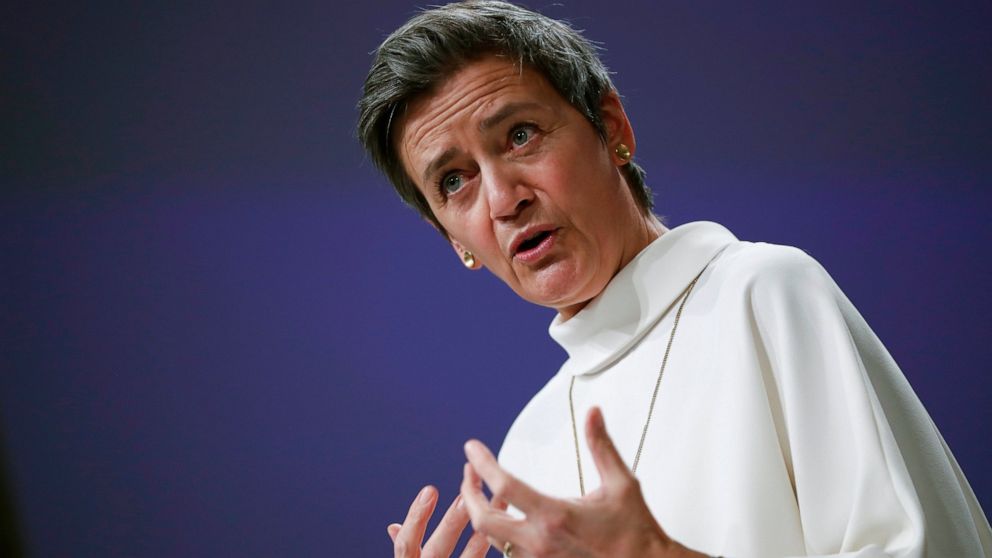EU accuses Apple of antitrust breach after Spotify complaint
European Union regulators are accusing Apple of violating the bloc’s antitrust rules, alleging that the company distorts competition for music streaming through rules for its App Store
LONDON — European Union regulators accused Apple on Friday of violating the bloc’s antitrust laws, alleging the iPhone maker distorts competition for music streaming by imposing unfair rules for rival services in its App Store.
The EU’s executive Commission said it objected to Apple’s rules for music streaming services that compete with its Apple Music service, saying they end up costing consumers more and limiting their choices.
The charges underscore the long-running feud over app payments between Apple and popular music streaming service Spotify, which filed a complaint that sparked the investigation – one of four the company is facing from the EU. Regulators in Brussels are also investigating other big U.S. tech companies like Amazon and Google, amid a growing global movement to rein in their power.
The EU’s competition commissioner, Margrethe Vestager, outlined two main concerns. One centers on Apple’s practice of forcing app developers selling digital content to use its in-house payment system, which charges a 30% commission on all subscriptions.
The other concern is that Apple prevents app makers from telling users about cheaper ways to pay for subscriptions that don’t involve going through an app.
Apple rejected the charges, saying it was proud of its role in helping Spotify grow into a music streaming giant. The company also pointed out Spotify doesn’t pay Apple a commission for 99% of its paid subscribers.
“Once again, they want all the benefits of the App Store but don’t think they should have to pay anything for that,” Apple said in a statement. “The Commission’s argument on Spotify’s behalf is the opposite of fair competition.”
Vestager said while Spotify had grown despite the restrictions, they were hurting business for smaller music streaming players like Deezer and Soundcloud.
The App Store rules are an issue beyond just music streaming services because many other app makers depend on it as a “gatekeeper” to iPhones and iPads, Vestager said.
“This significant market power cannot go unchecked as the conditions of access to the Apple App Store are key for the success of app developers,” she told reporters in Brussels.
Vestager noted that Apple Music isn’t subject to the same rules, which hurts rivals by raising their costs, reducing their profit margins and making them less attractive on the App Store. She said the problem is not the fee itself, but that Apple only charges it on payments for digital content and not other services such as transport or food deliveries. The EU’s investigation found it typically pushed up the price of a monthly subscription to 12.99 euros ($15.70) from 9.99 euros, she said.
Spotify refuses to use Apple’s app payment system to sell premium subscriptions, instead requiring customers to go through its website. Epic Games, which makes the popular video game Fortnite, has also filed an EU antitrust complaint against Apple. When it tried to bypass the App Store with its own payment system, Apple kicked out the Fortnite app.
Apple’s ban on communicating with customers means app makers can’t get the same insights into their users that Apple does, such as the reason for canceling a subscription, Vestager said.
“Not only are they not allowed to mention their websites or any link to them in their own apps,” Vestager said. “They are also not allowed to send emails to users that created an account in the app in order to inform them about cheaper alternatives.”
Apple has 12 weeks to respond to the EU’s objections. Under EU competition law, companies could offer a remedy — Vestager indicated she thought “Apple should end the infringement” and not do anything that would have the same effect. Or else, companies could be fined up to 10% of their annual revenue for breaches. For Apple, which reported $274.5 billion in revenue in its latest financial year, that could mean a fine of up to $27.4 billion.
Spotify welcomed the EU’s move. It’s “a critical step toward holding Apple accountable for its anticompetitive behavior, ensuring meaningful choice for all consumers and a level playing field for app developers,” the company’s chief legal officer, Horatio Gutierrez, said in a statement.
———
For all of AP’s tech coverage, visit https://apnews.com/apf-technology
———
Follow Kelvin Chan at www.twitter.com/chanman
![]()


